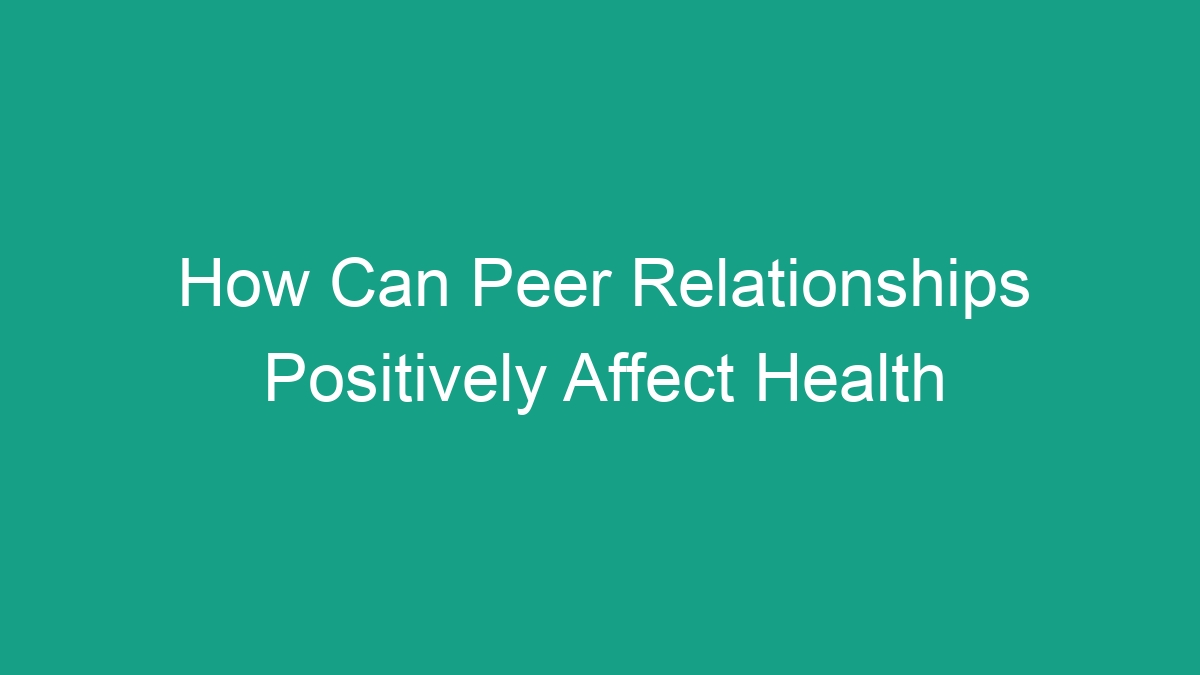
Peer relationships play a crucial role in our overall well-being, including physical, mental, and emotional health. Positive peer relationships can lead to improved self-esteem, reduced stress levels, and a stronger sense of belonging. In this article, we will explore the various ways in which peer relationships can positively affect health and well-being.
The Importance of Positive Peer Relationships
Peer relationships refer to the connections and interactions we have with our peers, who are individuals of similar age, background, or interests. These relationships can occur in various settings, including at school, work, within social groups, and in the community. Positive peer relationships are important for several reasons:
– Emotional support: Peers can provide emotional support during challenging times, reducing feelings of loneliness and isolation.
– Socialization: Peer relationships help individuals develop important social skills, including communication, empathy, and conflict resolution.
– Sense of belonging: Positive peer relationships can create a sense of belonging and acceptance, which is essential for mental and emotional well-being.
– Influence: Peers can have a significant influence on attitudes, behaviors, and lifestyle choices, which can impact health outcomes.
Ways in Which Peer Relationships Positively Affect Health
1. Emotional Well-being
Positive peer relationships can have a direct impact on emotional well-being, providing individuals with a support system during difficult times. When individuals feel connected to their peers and have a strong social support network, they are better equipped to manage stress, anxiety, and depression. Additionally, positive peer relationships can contribute to increased feelings of happiness, contentment, and overall life satisfaction.
2. Self-Esteem and Confidence
Peer relationships play a critical role in shaping an individual’s self-esteem and confidence. When individuals feel valued and accepted by their peers, they are more likely to develop a positive self-image and a greater sense of self-worth. This, in turn, can lead to improved mental health and a lower risk of developing psychological disorders.
3. Physical Health
Research has shown that positive peer relationships can have a positive impact on physical health outcomes. For instance, individuals with strong social support networks are more likely to engage in healthy behaviors, such as regular physical activity, healthy eating habits, and regular healthcare check-ups. Additionally, the emotional support provided by peer relationships can help reduce the risk of developing chronic conditions and improve overall health.
How to Cultivate Positive Peer Relationships
Cultivating positive peer relationships is essential for harnessing the health benefits associated with these connections. Here are some strategies for building and maintaining positive peer relationships:
– Communication: Effective communication is key to nurturing positive peer relationships. This includes active listening, empathy, and open and honest dialogue.
– Mutual support: Offering support and being receptive to support from peers fosters a sense of reciprocity and strengthens the bond between individuals.
– Shared activities: Engaging in shared activities and hobbies with peers can help build common interests and strengthen connections.
– Positive influence: Surrounding oneself with peers who have a positive influence can lead to beneficial health outcomes.
FAQs
Q: Can peer relationships have a negative impact on health?
A: While positive peer relationships can be beneficial, negative peer relationships can contribute to stress, anxiety, depression, and other health issues. It’s important to recognize when a peer relationship is unhealthy and seek support or distance oneself from negative influences.
Q: How do peer relationships impact mental health?
A: Positive peer relationships can provide emotional support, reduce feelings of loneliness, and contribute to a sense of belonging, all of which can positively impact mental health. Conversely, negative peer relationships can lead to increased stress and feelings of isolation, which can negatively impact mental health.
Q: Can peer relationships affect physical health outcomes?
A: Yes, positive peer relationships can influence physical health outcomes by encouraging healthy behaviors, providing emotional support, and reducing stress levels. Strong peer connections can also contribute to a lower risk of developing certain chronic conditions.
In conclusion, positive peer relationships have the potential to significantly impact our overall health and well-being. By nurturing and maintaining healthy connections with peers, individuals can experience improved emotional well-being, increased self-esteem, and better physical health outcomes. It’s important to recognize the value of positive peer relationships and actively cultivate these connections for a healthier and more fulfilling life.



